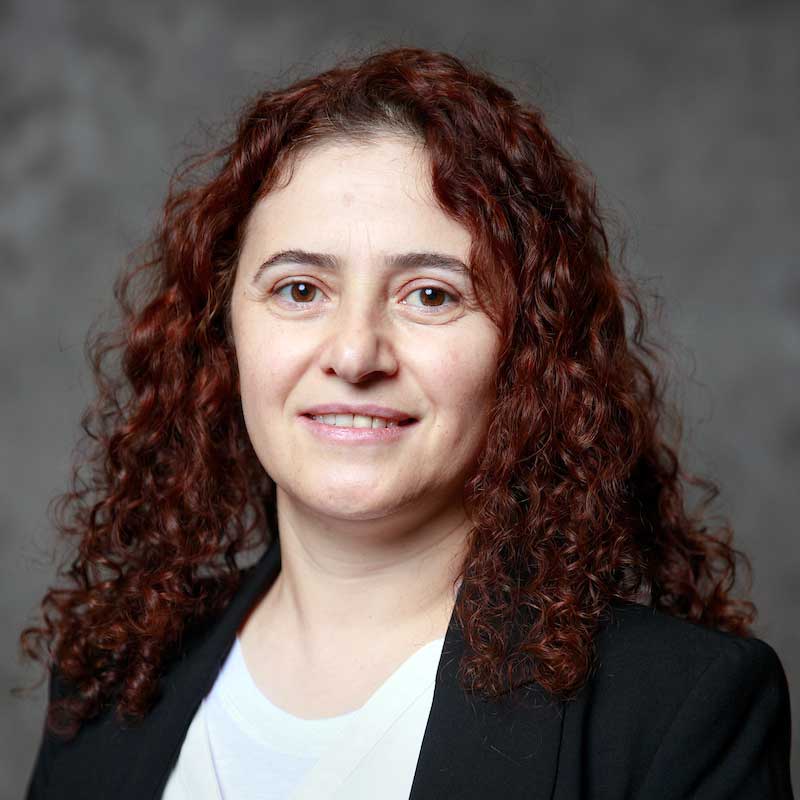
EDUCATION
| Degree | Area of Study | University |
|---|---|---|
| Ph.D. | Mathematics Education | Syracuse University |
| M.S. | Statistics | University of New Hampshire |
| M.S. | Teaching and Curriculum | Syracuse University |
| B.S. | Mathematics Education | University of Balikesir, Necatibey Faculty of Education, Turkey |

AWARDS AND HONORS
| Year | Award |
|---|---|
| 2021 | Robert M. Exner Prize for Excellence, Ph.D. program Mathematics Education at Syracuse University |

AREAS OF EXPERTISE
Data Science and Machine Learning
Quantitative, Covariational & Creative Mathematical Reasoning
Representations

KEY RESEARCH PROJECTS
Most Recent Projects on Data Science with collaborators (Drs. Sevgi Gurbuz and Chris S. Crawford)
- iRF-Games: Teaching Data Science via Interactive RF and Robotic Experimentation: This project pioneers interactive educational experiences to teach core data science concepts via video and radio frequency (RF) sensing-enabled human-computer interaction (HCI) for virtual and robotic control-based games.
- Sensing for Data Science: A Web-based Interactive Learning Platform for Next Generation Secondary Education: This proposal presents a 4-year ITEST Developing and Testing Innovations (DTI) project that pioneers an educational platform and instructional materials focused on the innovative use of novel cyber-physical humansystems (CPHS) for hands-on data science education.
- Interdisciplinary Educational Computing for Teaching Mathematics and Science Courses: This project develops cross-curricular resources, which currently do not exist in the state, for our teacher candidates to become better equipped to teach and integrate computer science at the K-12 level. Collaborators on the project: Drs. Amanda Cramer, Feiya Luo, Shannon Gooden Davidson.
Funded Projects
- Altindis (PI), N., Gurbuz, S., Z., Crawford, C., ($1,270,294): Sensing for Data Science: A Web-based Interactive Learning Platform for Next Generation Secondary Education. National Science Foundation, ITEST, Start Date: 9-15-2025 End Date: 08-31-2029
- Altindis (PI), N. Luo, F. & Davidson, S., Cramer, A. ($29,150), Interdisciplinary Computer Science Course for Secondary and Elementary Teacher Candidates. College of Education Rising Tide Grant Program—AY 2025-2026.

RESEARCH INTERESTS
Data Science

HIGHLIGHTED PUBLICATIONS
- Altindis, N., & Fonger, N. (2025). A culturally inclusive mathematics learning environment framework: Supporting students’ representational fluency and covariational reasoning. Education Sciences, 15(8). https://doi.org/10.3390/educsci15080980
- Altindis, N. (2025). Networking theories of quantitative reasoning and mathematical reasoning to explore students’ understanding of functions. The Journal of Mathematical Behavior, 80, 101276. https://doi.org/10.1016/j.jmathb.2025.101276
- Bowe, K. A., Altindis, N., Bauer, C. F., & Aikens, M. L. (2025). Cognitive resources drawn from different STEM disciplines for interpreting a titration experiment logistic graph: A case study of student thinking. Disciplinary and Interdisciplinary Science Education Research, 7(20). https://doi.org/10.1186/s43031-025-00140-0
- Altindis, N., Bowe, K. A., Couch, B., Bauer, C. F., & Aikens, M. L. (2024). Exploring the role of disciplinary knowledge in students’ covariational reasoning during graphical interpretation. International Journal of STEM Education, 11(1). https://doi.org/10.1186/s40594-024-00492-5

PROFESSIONAL MEMBERSHIPS / ACTIVITIES
- Editorial Board Member (2023-Present), International Journal of Undergraduate Research(IJUR)
- Board Member / Treasurer (2017- Present), TERRA Science and Education, Syracuse, NY

TEACHING PHILOSOPHY
Dr. Altindis’ teaching philosophy centers around cultivating a community of learners within research-based, inclusive, and active learning environments. She believes that everyone can develop an understanding of mathematics and teaching skills centered around ambitious high-quality mathematics instructions.

BIOGRAPHY
Dr. Hazel Altindis is an Assistant Professor in the Department of Curriculum and Instruction at the University of Alabama. Dr. Altindis has previously contributed to projects focused on (1) characterizing the graphical interpretation and covariational reasoning skills of STEM undergraduate students and (2) designing and implementing active learning environments to support a meaningful understanding of Calculus for undergraduate students.
Currently, Dr. Altindis is exploring innovative ways to enhance secondary pre-service teachers’ understanding of machine learning through reasoning and representation. Additionally, she is focused on supporting secondary students’ meaningful understanding of mathematics, particularly the co-emergence of quantitative reasoning and representational fluency, and developing resources for computing-integrated mathematics teaching and learning for Grade 6-12 students and teachers.
